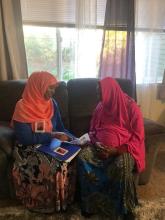by Rachel Chapman, Muna Osman, Hodan Rage, Sumaya Mohamed
A Project with Deep Roots
The Mama Amaan Project (safe motherhood in Somali), emerged from a series of community organizing relationships and advocacy partnership efforts, culminating in the implementation of an innovative perinatal education and doula care model in the Somali community.
Our project received a UW Royalty Research Fund (RRF) grant for ethnographic study partnering with the Somali Health Board, Health Alliance International, Somali Doulas Northwest, and Parent Trust. A UW Population Health Initiative Seed Grant partnered Somali researchers and care providers with UW faculty from Anthropology, Global Health, Social Work, Pediatrics, and Psychiatry.
Decolonized Anthropology Matters in a Community with Deep History and Commitments
Our project was birthed by energy and leadership of a vibrant team of Somali women researchers and care providers, mostly UW alumna or current undergraduates and graduates. The bottom line for our team was that direction of the project, control of the data, use of resources and representations of Somali people must always center and be responsive to community needs — what we started to call “decolonizing university/community relationships.” For a community in which many have experienced war, migration, family separation, language barriers, institutional violence and lack of power and resources in their new home setting, trust-building was key.
We also learned that trust to participate in Mama Amaan groups had to travel by trusted word of mouth, and that many women were very isolated and too encumbered with family and work duties to leave home and small children for an extra event every month without having childcare and assistance with transport. When we provided these supports, the sessions were full and lively.
Safe Motherhood in the Time of COVID-19
A decolonized, community-led and engaged medical anthropology is needed, especially now, when culturally congruent responses to COVID are more important and potentially lifesaving than ever. Somali team members are delivering care on the frontlines as essential workers and being community-based researchers means seeing effects of the pandemic up close. Vulnerability to job, food and housing insecurity, as well as social isolation and lack of access to health care, especially with language interpretation available, has only intensified.
Further, a core shared value across the Somali community, and in fact, throughout the Muslim faith, is daryeel — Somali for an abiding commitment to helping others in need and visiting those who are sick and suffering to bring sustenance and comfort. It has seemed at times as if COVID-19 policies of sheltering in place, social-distancing, quarantine for those with symptoms, and aggressive test-seeking was falling by the wayside.
Recently, tragic news circulated of a Somali mother and grandmother in one family dying of COVID-19 within 48 hours. This sounded an alarm that is passing by trusted word of mouth. Community leaders have guided the outpouring of community care by suggesting alternatives to visiting, like contributing to a Go Fund Me.
In this urgent time, our team turned to a project activity that is needed right now. Ubalbalaadhi hooyo – the project’s WhatsApp and Facebook accounts were initiated to allow women to attend our peri-natal groups in Somali from home, and even send in questions for Somali care providers to answer online or during a session. Today, a social media gathering trusted and enjoyed by Somali women is perfect to share COVID-related information. Here are three messages for our communities and for caring providers to take time to convey:
- Protect yourself, family and community. Wash hands often, especially after going out on an errand or work, and stay home whenever possible. Wear a mask if you have one when going out or even at home if you have symptoms of dry cough, fever, tiredness, shortness of breath. Covering the nose and mouth wearing hijab helps to protect yourself and others.
- Take good care of yourself. Build your immune system by taking your Vitamin D, C, and Zinc. Make sure you eat fruit and vegetables, and get plenty of rest. Mental and emotional health matters, so tune into your feelings. Start or continue exercises, like a 30 minute walk or dancing with your kids. And lastly, reach out and tell someone when you cannot cope with stress and anxiety.
- Seek medical care. If you have COVID-19 early symptoms — dry cough, fever, tiredness, shortness of breath, loss of appetite, smell or taste, sore throat, head or body aches — get medical attention. If interpreter services are not provided, please make a request. You have the right to be understood in your language.
Remember, takawal A'ala allah —do your best and trust Allah. Thank you! Mahansanid!
